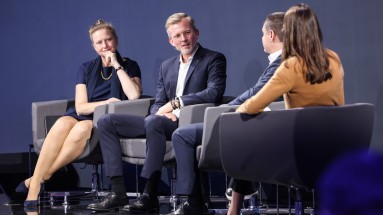Page content
AI with a Keen Sense

A generative AI that gets creative with tax returns? That's not exactly desirable, said Prof. Dr. Luise Hölscher, State Secretary at the Federal Ministry of Finance, during the panel "AI Applications in the Public Sector" at the Smart Country Convention. The use of AI is fundamentally undisputed, but the question is: Where can AI help, and where shouldn't it be used? "A bot that explains tax returns to me in detail, on the other hand, would be a good thing," Hölscher remarked.
She mentioned several examples where AI is already being applied in her field: AI analyses large datasets to determine which companies qualify for federal audits, and at customs, import data from containers are reviewed, and selections are made for further inspection. "In financial administration, we deal with numbers and large datasets. So far, we've had financial experts with 30 years of experience who have a knack for spotting something unusual. Given the shortage of skilled workers, we need to teach this 'knack' to a software," explained the State Secretary.
A Clear Framework is Crucial
The areas where AI can be applied almost find themselves, said Alexander Britz from Microsoft Germany. "The shortage of skilled workers is the greatest driver of innovation that the German administration has ever seen." The enthusiasm is there, and now it's essential to create the framework – a set of rules, not only legally, but also individually within every authority and organization. "It’s about asking: What limits do we set for ourselves, and how do we ensure the correct use of AI?" said Britz.
Both internally and externally, it must be communicated transparently what exactly AI will be used for. Employees must understand the technology and processes in order to apply them correctly. "The topic of AI is a task for leadership; it can’t just be delegated to IT," explained the Microsoft expert. It's important to alleviate fears and focus on the opportunities. "AI will fundamentally change public life. Now it's about harnessing human intelligence and creative power to apply it optimally," Britz added.
Dr. Dirk Günnewig, State Secretary at the Ministry of Finance of the State of North Rhine-Westphalia, emphasized close collaboration with academia and business to initiate scalable AI pilot projects. "We want to make things as easy as possible for citizens, but we must not forget the back office, the administrative sector," he said. Training is essential so that employees receive the targeted information they need. "We need to make it clear to everyone what AI can offer each individual," confirmed Timo Nink from Accenture.
Become an exhibitor at #SCCON25
As a driving force for the future of digital administration and for equal digital living and working conditions in cities and rural areas, the Smart Country Convention is a must for all stakeholders who actively advance the digital transformation. Are you interested in advancing the digitization of our cities and municipalities too? Join us and position your company or municipality as an expert in digitalization in the public sector.



